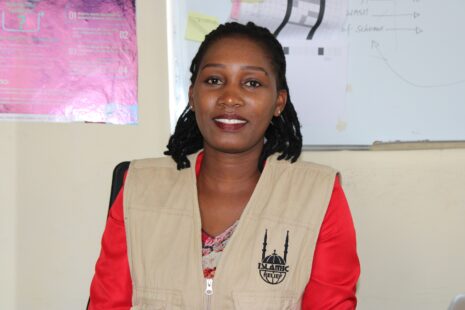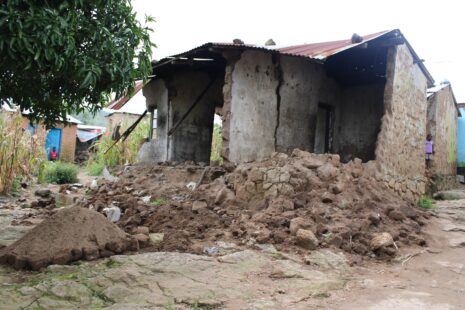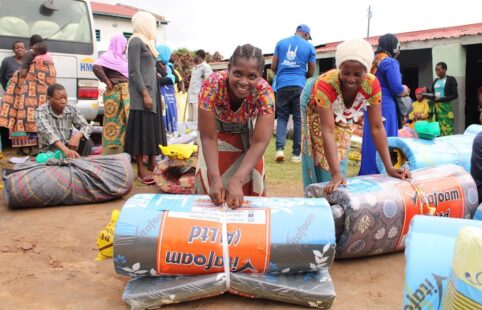In her first blog for Islamic Relief, Elizabeth Mandala, communications and reporting officer at Islamic Relief Malawi, shares what it was like responding to the devastating impacts of Cyclone Freddy earlier this year, and how desperately those affected still need assistance.
‘Temporary Closure of Operations’ read the subject of the email I received from the Human Resources Officer on March 12. It had been sent to all Islamic Relief Malawi staff.

I felt the situation was just beyond human control; houses were collapsing in the blink of an eye, roads were being washed away, livestock and human bodies were floating in flooded water banks, electricity poles had been destroyed, water pipes had burst and houses had no water supply. It was not safe for anyone to leave their homes and no public transport was operating that day.
However, office operations were not completely shut down. One of my colleagues was on the ground feeding the team with information on what was unfolding . He had to monitor the situation and assess the urgent needs of those affected.
From March 10 to 14 this year, Malawi was struck by Tropical Cyclone Freddy, causing floods and mudslides. The disaster displaced over half a million people and left 680 dead and more than 2,000 injured. To date, some people are still missing, believed to be buried under rocks that crashed down from the mountains.
My eyes and ears were glued to social media. It was overwhelming. Images and video clips of people calling for help kept popping up… they were on the verge of being washed away. Some were rescued while others never made it.
The most heartbreaking and disturbing situation I saw was that of a mother who left her 6-year-old girl behind while she rescued her neighbour whose house had collapsed. Within seconds, water came rushing down a nearby hill.
The mother turned back to grab her daughter, but unfortunately, she couldn’t make it. There was just too much water. She could only stand by and watch her daughter scream for help: “Amayi inu! Amayi inu!” (“Mum! mum!”). Those were her last words. No one dared to try and reach the little girl and then she was gone, along with the family’s house.
It was a devastating ending.
A return to ‘normal’
‘Please note that normal operations shall resume on Tuesday 14 March 2023,’ the last part of the email from HR had read.
When the time came, I braced myself and showed up for work, as did all my colleagues. Seeing them was a huge relief, however everyone was still in disbelief after the traumatic experience of the past few days.
We got ourselves together and agreed to be strong and to offer our compassion to others in the community. As humanitarians we were prepared to fulfil our core duties in reaching out to those more severely affected than us.

It was still raining heavily, with wind blowing from all directions. I grabbed my camera and joined a team that was visiting camps to further assess and identify the urgent needs of those affected. Our colleague who had been on ground throughout told us where to go.
We arrived at a camp that had been set up in a primary school in Blantyre – the worst-hit district. Over 900 people, including men, women and children, had come to seek refuge on the school premises. They had all lost their homes and belongings. Some had lost their entire family.
They welcomed us with sad faces.
Saddest of all was a very little girl, who must have been only 5 or 6 years old. I saw her sitting on the floor of a classroom with broken windows, shivering uncontrollably.
“Can her mother cover her up? She is feeling cold,” I asked one of the women sitting nearby.
“Her parents are gone. They got washed away during the floods”.
My heart dropped. I hadn’t expected this response.
Nursing the wound from the sting
After the assessment was complete, we returned to the office. And not long after that, we received funds from the wider Islamic Relief family, which allowed us to immediately start supporting some of those affected.
Our goal was to provide relief, and we did manage to put smiles on some faces and give hope to those yet to receive help.
When Ramadan came, it was quite challenging for many who could not yet rely on having enough food to eat. As a way of helping them recover, we distributed food packs to those hardest hit by the disaster, and to those living in the most disaster-prone areas.

Islamic Relief continues to provide essential items to those affected by the cyclone. We give starter packs to those who want to rebuild their houses, and supply kits to women and others to help maintain good hygiene during this time of upheaval.
There is still a huge need for shelter, many affected families have not been able to rebuild their houses. I wish I could share it all here, but the magnitude of the effects of the cyclone is just overwhelming.
To date, 600 camps, especially those that were set up in schools, have been decommissioned, while 147 across the 11 worst-affected districts are still operational. Many people from the closed camps have been forced to move in with relatives or friends, while others have become homeless. A few people have made temporary shelters out of grass and plastic sheets while they look for assistance and wait. But how long will they have to live like this?
Despite the dire situation, Islamic Relief has given hope to those affected by the disaster. Our work is fantastic, and is appreciated by many in the communities. It’s my wish that others come forward to join us in offering support so that everyone affected can get back to their normal lives.
The fallout from disasters like Cyclone Freddy can take years to recover from. Please help Islamic Relief to continue supporting those affected by the disaster. Donate now.
Elizabeth is one of our new regular bloggers. Each month, she’ll share stories from her work at Islamic Relief.










